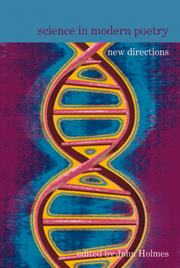Book contents
- Frontmatter
- Contents
- List of Contributors
- Acknowledgements
- Introduction
- Part I Science and Contemporary Poetry: Cross-Cultural Soundings
- Part II Science in Modernist Poetry: Appropriations and Interrogations
- 5 ‘Strange Synthetic Perfumes’: Investigating Scientific Diction in Twentieth-Century Poetry
- 6 The Human Animal: Biological Tropes in Interwar Poetry
- 7 William Empson, Ants and Aliens
- 8 Ezra Pound and the Materiality of the Fourth Dimension
- Part III Darwinian Dialogues: Four Modern Poets
- Afterword
- Bibliography
- Index
5 - ‘Strange Synthetic Perfumes’: Investigating Scientific Diction in Twentieth-Century Poetry
from Part II - Science in Modernist Poetry: Appropriations and Interrogations
- Frontmatter
- Contents
- List of Contributors
- Acknowledgements
- Introduction
- Part I Science and Contemporary Poetry: Cross-Cultural Soundings
- Part II Science in Modernist Poetry: Appropriations and Interrogations
- 5 ‘Strange Synthetic Perfumes’: Investigating Scientific Diction in Twentieth-Century Poetry
- 6 The Human Animal: Biological Tropes in Interwar Poetry
- 7 William Empson, Ants and Aliens
- 8 Ezra Pound and the Materiality of the Fourth Dimension
- Part III Darwinian Dialogues: Four Modern Poets
- Afterword
- Bibliography
- Index
Summary
In a well known passage, Mikhail Bakhtin wrote that ‘all words have the “taste” of a profession, a genre, a tendency, a party, a particular work, a particular person, a generation, an age group, the day and hour’ (1981, 293). Compared with the subtle social distinctions that Bakhtin alludes to, one might expect the flavour of scientific vocabulary to stand out very vividly; but verbal flavours lose their distinctiveness over time, and in any case, some poets like to exploit terms that are already polysemous and which belong to no single professional tongue. The investigation of scientific terms in poetry must be historical, and in an ideal scenario must avail itself of evidence of reception. Even an historical dictionary like the Oxford English Dictionary is insufficiently nuanced; we are interested less in what the OED declares to have been a scientific usage than in what the audience for any given poem believed.
Reception evidence can guide us in other ways which may become increasingly important for literary criticism. For many years, critics interested in scientific diction in poetry have relied on serendipitous findings in the process of lifetimes of wide reading. A comparison such as Robert Crawford's of the uses of ‘uterine’ (in Chapter 4 of the present volume) is only rarely possible. In coming decades, the digitisation of poetry (both in and out of copyright) should make such searches very easy to achieve. But coming into possession of a rich corpus of material places a greater onus on the critic to ask the right questions of it.
- Type
- Chapter
- Information
- Science in Modern PoetryNew Directions, pp. 87 - 100Publisher: Liverpool University PressPrint publication year: 2012
- 2
- Cited by

